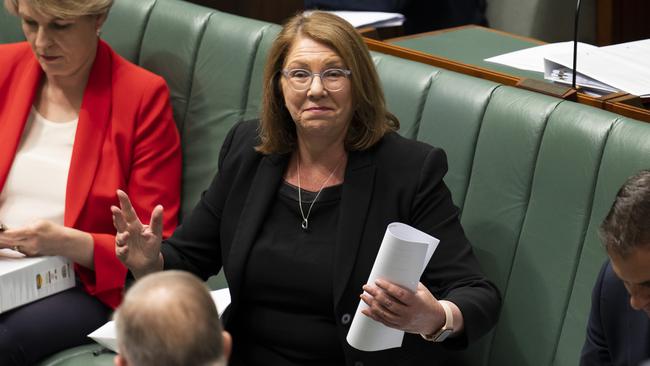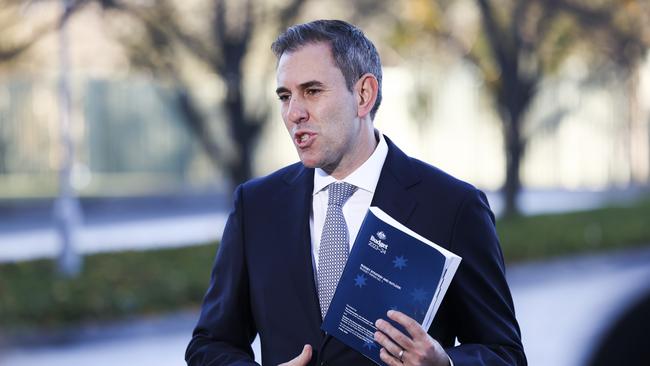What’s in the 2023-24 Federal Budget for Victorians?
The Federal Budget touts cost-of-living relief, health care funding, and a review of hundreds of local road and rail projects which could see them scrapped. Here’s what it means for you.

News
Don't miss out on the headlines from News. Followed categories will be added to My News.
Victorians will have to wait at least three months to know if infrastructure projects not specifically promised by the federal Labor Party, or not already underway, will go ahead.
The 2023-24 Federal Budget, revealed on Tuesday, touts cost-of-living relief, health care funding, and economic prudence.
But a 90-day review of a national scheme will put hundreds of infrastructure projects across the country under scrutiny, meaning scores of Victorian projects might not proceed.
Infrastructure Minister Catherine King said the number of infrastructure projects Australia-wide had blown out from 150 to nearly 800 under the former government, with many lacking adequate funding.
“The Albanese Government is keeping the $120 billion rolling 10-year pipeline – and every dollar remains in the budget,” she said.
“ But it would be irresponsible to move ahead without fixing the backlog.
“This review will allow all levels of government time to consider the projects that are actual priorities, and assess their cost and deliverability in the current climate.
“The process will help to lay firm foundations to build a more sustainable, credible pipeline of investment.”
Treasurer Jim Chalmers said the Infrastructure Investment Program had “drifted away” from important national projects, and that market and price pressures had increased.
“An independent strategic review will ensure the Government’s $120 billion pipeline over ten years is fit for purpose and the Government’s investment is focused on projects which improve long-term productivity, supply chains and economic growth in our cities and regions,” he said.
And although there is a federal assurance to help out Victoria with the hosting of 2026’s Commonwealth Games, negotiations continue between the state and federal governments as to what that assurance means and how much it is worth to regional host cities.

$70M IN COMMUNITY PROJECTS TOUTED
Victorian councils will share in $70m for local road and community projects, while Albury Wodonga and Geelong will get boosts towards local projects.
Albury Wodonga will receive $53m in the next two years ($15m this year and $38m in 2024/25) to be put towards projects “that deliver economic and education benefits and improve the liveability of the community”.
Projects along the Great Ocean Rd and Geelong city centre, including the Shipwreck Coast masterplan, will share in a $65m Geelong bundle.
$1.5b will go towards Renewable Energy Zones and offshore wind in Victoria, and the federal government will establish a Net Zero Authority to help with the diversification of the economy and “smooth” the transition to clean energy in traditional industries.
Elsewhere Victoria will receive $31m over the next four years for black spot projects.
The government will spend $4.5m for bridge upgrades in 2023-24, with that figure increasing to $10.4m the following financial year as part of the Bridges Renewal program.
Roads of “national significance” will get a $1.2b “efficiency and safety” improvements; $60.7m will be spent on key freight routes; and $15.2m will go towards improving the safety of heavy vehicles.
Rail investment will total $1.2b.
COST OF LIVING LIFELINES
Meanwhile, Victorians will benefit from energy bill relief of $500 for eligible individuals and $650 for small businesses.
Under this year’s budget, the First Home Guarantee and Regional First Home Guarantee will be expanded to any two eligible borrowers, rather than only couples, and to people who have not owned an Australian property for the preceding 10 years.
A $1.3b fund will create low interest loans and pay for energy-saving improvements to public housing.
JobSeeker and other income support payments will be increased by $40 and eligibility for the higher JobSeeker rate of about $92 a fortnight will be reduced to people 55 years or older.
Thanks to a $1.9b investment over five years, from September 2023, eligible individuals on the Single Parenting Payment will receive the stipend until their youngest child turns 14, rather than eight.
The government will introduce tax incentives for build-to-rent housing projects and an extra $2b will be spent on public and affordable housing.

BILLIONS FOR HEALTH
Bulk billing incentives will be tripled at the cost of $3.5b for clinic visits by children under 16, pensioners, and concession card holders.
More than 300 medicines on the PBS will be dispensed in greater amounts under a policy to be phased in from September this year, meaning some patients with stable, chronic conditions will be able to get two months’ worth of medicine and halve their trips to the chemist.
The policy has irked some pharmacists, who will receive less money from dispensing fees as a result of the reduction in trips.
FUNDING TO MAKE US DISASTER READY
Nationwide, $200m will be provided to a Disaster Ready Fund for levee upgrades, seawalls and bushfire risk reduction projects.
A further $8.6 million will be spent to set up a National Emergency Management Stockpile, meant to provide state and territory governments with quick access to disaster resources, such as emergency shelter camps, water desalinisation, and power generation.
A new National Messaging System will provide real-time emergency information to mobile phones across the country.


